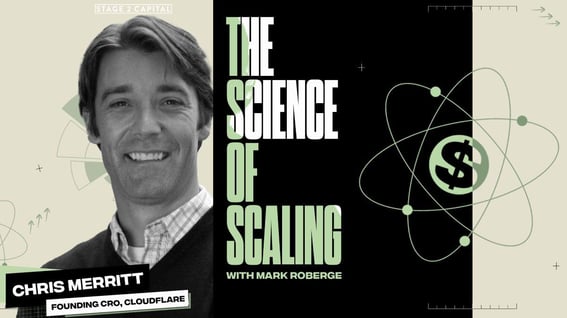Unlocking Growth: How Companies Win by Laser-Focusing on ICPs & Use Cases
AlignICP founder and CEO Dan Sperring shares insights to scaling successfully via a data-driven ICP and use case mastery.

AlignICP founder and CEO Dan Sperring shares insights to scaling successfully via a data-driven ICP and use case mastery.

If you're in B2B SaaS and hungry for growth, you're not alone in chasing scale. But here’s something surprising from the latest episode of The Science of Scaling—the companies winning big aren’t chasing every prospect in sight. Instead, they're doubling down on a sharply defined ideal customer profile (ICP) and the high-value use cases those customers actually care about.
As Dan Sperring, founder and CEO of AlignICP, points out, start by being “the best in the world at one use case.” That focus isn’t just a strategic slogan—it’s backed by data. According to host Mark Roberge: “Companies with a tightly defined ICP, operationalized on the front line, spend 50% less on sales and marketing, have CAC payback periods that are 24% shorter, and see a 425% higher first-year expansion rate with ICP customers compared to everyone else.”
That’s staggering. Yet, most companies aren’t executing this well: only 20% of pipeline opportunities and 30% of current customers typically fit the ICP. Opportunity, meet upside.
The show drilled into lessons from Dan’s background running win/loss analysis in Customer Success. The biggest signal of future growth wasn’t company size or even the buying persona—it was whether customers activated key use cases quickly and got real value. Those who did became long-term, expanding customers. Those who didn’t—regardless of their logo’s prestige—often churned.
Dan describes two customer groups:
What sets them apart? Not your onboarding team—it’s who the customer is and what they actually hope to achieve with your product.
Here’s the actionable insight: You can often predict high-LTV customers with a simple interview about their intended use case at sign-up. That matters *more* than demographics, company size, or industry. Sales teams should stop giving generic demos and start tailoring everything—from pitches to onboarding—around the customer’s real use case.
Roberge shares a practical training hack: categorize demos into 2-3 “buckets” based on core use cases. Train reps to choose the right demo, not just do one-size-fits-all. Then, ensure onboarding and Customer Success are aligned to that same use case. It’s “custom,” but scalable.
The episode takes on the classic VC/founder debate: Does focusing on one market or use case limit your total addressable market (TAM) and future funding? Both agree: it’s not about picking a narrow vertical forever—it’s about dominating a high-value use case that could cross verticals, then earning the right to expand. As Dan puts it, “Pick a use case that’s prevalent across markets, be best in the world at it, and expand from there.”
That’s echoed by research Dan references: compared to horizontal SaaS, vertical SaaS firms see 24% shorter CAC payback and spend 50% less on sales/marketing. But even horizontal companies can win by hitting specific use cases first.
Operationalizing your ICP isn’t a marketing exercise—it’s about labeling accounts in your CRM, tracking which customers actually renew and expand, and looping that data into every step of go-to-market. HubSpot data says organizations with well-defined ICPs have 68% higher win rates. Yet, less than 7% of salespeople feel marketing generates great leads. The missing link? Programmatically tagging and refining ICPs based on real outcomes.
Both Dan and Mark see a role for AI in the next evolution—helping companies dynamically update their CRMs, focus on the right buying committees as contacts shift, and continuously identify ICP characteristics that predict lifetime value. The potential? Move from “boiling the ocean” to targeting those few thousand real prospects where your product shines.
If you want to scale efficiently—and actually win—you can’t afford to ignore the power of focusing on the right customers.
Want more tactical scaling advice? Subscribe to The Science of Scaling on your favorite podcast app, and check out Stage 2 Capital if you’re ready to take your startup to the next level.
~~~~~
Note: The insights shared in this podcast were initially distilled through advanced AI summarization technologies, with subsequent refinements made by the writer and our editorial team to ensure clarity and engagement.
Every week during a season, host Mark Roberge—co-founder and Managing Director at Stage 2 Capital and a senior lecturer at the Harvard Business School—interviews some of the tech industry's most successful and renowned leaders and managers in the areas of sales growth and Go-to-Market strategy. This is a HubSpot for Startups original podcast, and part of HubSpot's Podcast network. It's available on Apple, Spotify, and anywhere you get podcasts.

Find out how Cloudflare, a leading B2B software company, scaled successfully using an empathetic, customer-centric sales strategy in this interview with founding CRO Chris Merritt.

Mike relates the key sales and scaling strategies involved in LinkedIn’s success, focusing on capital efficiency and collecting customer feedback to help guide product design.

Learn how Loren Padelford, former VP of Revenue at Shopify, helped the company scale Shopify Plus from zero to over $1B in ARR.
